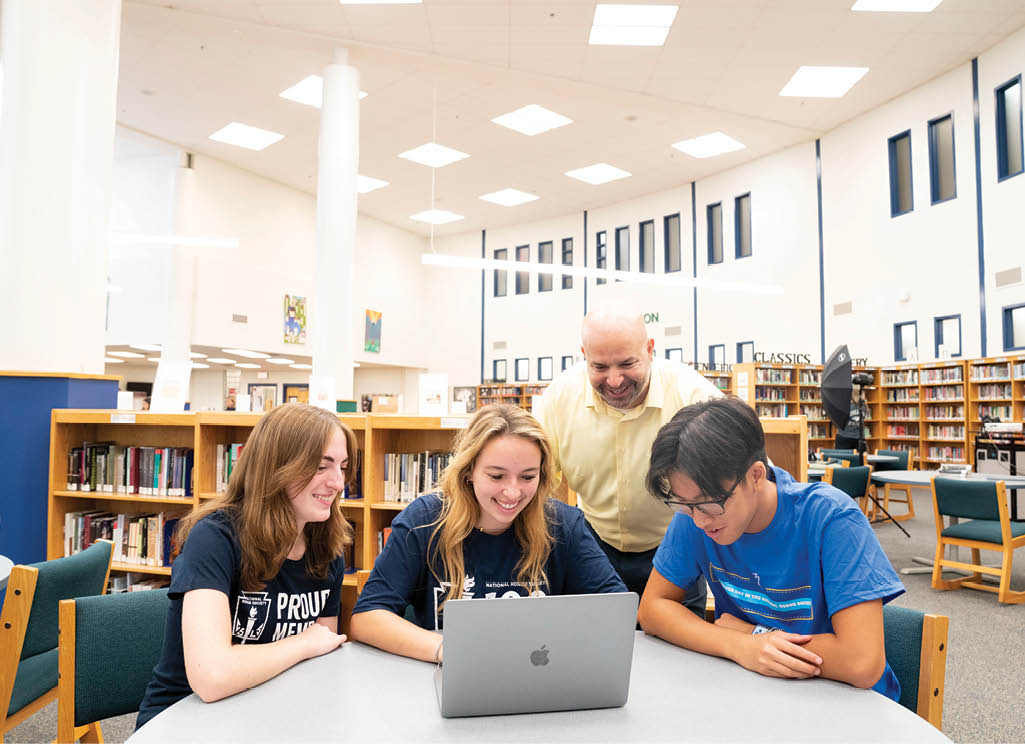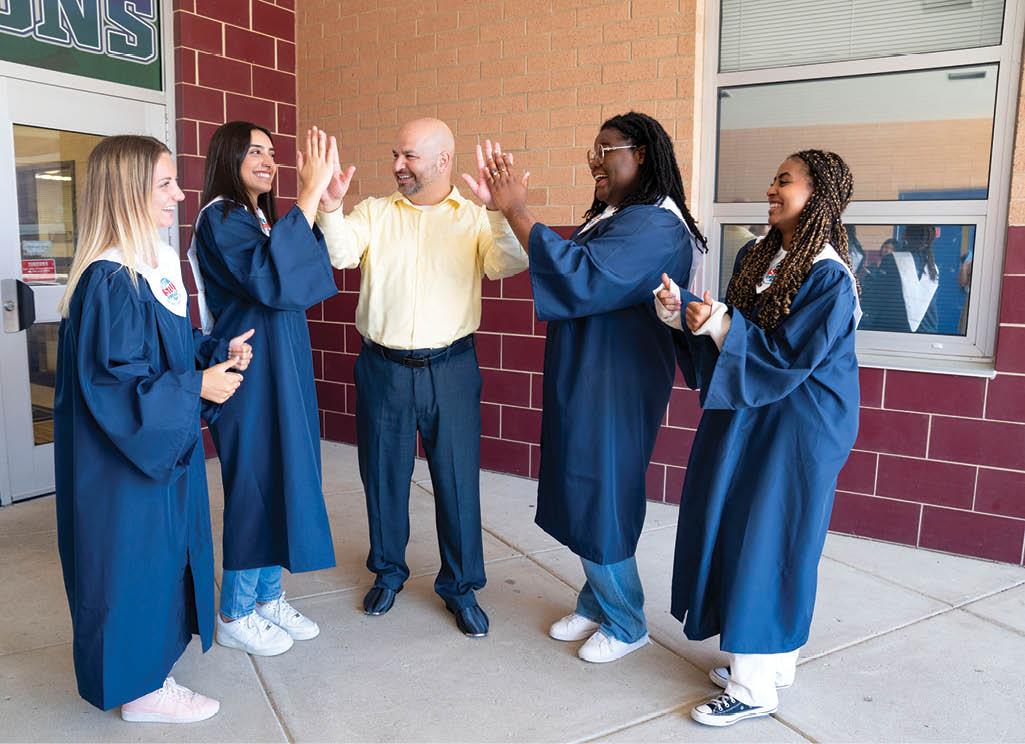Stay Golden

If you are a school leader, I don’t need to tell you why you were tired last year and maybe even considered leaving the profession. We’ve all been handling the same excessive stressors. What do I mean by excessive? In the last several months, schools across the country experienced tragedy after tragedy, ranging from student overdoses, anonymous threats to schools, sexual infractions, and even a school shooting of a teacher by an elementary school student in a district where I grew up and attended school. Most of my 26-year career in public education was spent in a neighboring district. On a more personally taxing note, last year I experienced the unthinkable as my school community grieved the loss of three students, two of whom were taken in an untimely car accident.

The above list doesn’t include the everyday stressors that all schools were already dealing with such as unfilled teaching positions, student drug and alcohol abuse, and students leaving school property without permission. And people wonder why we’re stressed.
So, what is a principal to do? I have two words for you: Stay golden. This gold reference holds a dual meaning for me. First, it reminds me of one of my favorite movies of all time, The Outsiders.
In this story, one of the main characters, Ponyboy, runs away from home with a friend, and while hiding out, they read a Robert Frost poem, Nothing Gold Can Stay. Later in the movie, when the friend, Johnny, is dying, he encourages Ponyboy to “stay golden,” meaning he believed that Ponyboy should continue to be good no matter the situation and should always look for the right thing to do in any circumstance. It was his call to action for Ponyboy to hold onto his morals and personal strength.
Does that sound familiar? Isn’t that what we are called to do as school leaders on a regular basis?

Tune Out the Noise
My struggle is that I often get distracted by the “noise” around me; things that aren’t priorities or reasons why I entered this profession. Think about it: How many times are you called into training sessions that don’t directly assist you in providing support to teachers or students? Have you ever experienced the frustration of wanting to observe or participate in classes with teachers and students, only to find your schedule packed with meetings that relate very little to what goes on in your school from day to day? How can we order our priorities to ensure that we are spending the right proportion of time doing the work we believe we are called to do?
The other meaning that “stay golden” holds for me is a reminder about the need to continue growing, even though oftentimes growth may hurt. Think about how gold is made. It must go through fire to burn away all of the impurities. If the gold had feelings and could talk, it would probably say that the fire is too much to handle. But once it makes it through, it’s so much better on the other side. Better brilliance. Better strength. As the impurities are burned away, gold realizes its purpose, thereby becoming what it was always meant to be.
The challenges that principals face do the same for us. There are imperfections within each of us, and the struggles we’re facing symbolize the fire that burns away our bad or underdeveloped habits. That process ultimately leads to our new growth and improvement. We’re becoming better educators. Better leaders. Better human beings. Ultimately, these experiences are shaping our views and, in some cases, changing them.
Is the fight hard? Yes. Is it painful? Definitely. But on the other side of these challenging experiences, we are becoming the leaders we were meant to be to solve the problems in front of us today. We would have never been able to solve today’s problems if we were the leaders of yesterday. I wasn’t the principal I needed to be today back in 2014–15 (when I first became a principal), for example.
Being an active listener for my staff, hosting events like Cookies with Khoshaba (which gives teachers a chance to sit down with me for 15 minutes and share their thoughts on anything they choose), and showing vulnerability are skills I developed during the past nine years that many stakeholders tell me are now my strengths. That’s growth for you: An undeveloped skill that matures with time and experience becomes a strength to use in the future.
I can’t tell you why you are fighting the specific fight in front of you today, but I can share that there’s something to learn from every experience. And isn’t that what being a lifelong learner is all about? What you learn—and how quickly you learn it—is up to you.
What Can Principals Do?
The answer to this question is as individualized as an IEP. Personally, I like to decompress by working out (lifting free weights and running on the treadmill four times a week), participating in networking activities through NASSP (like the School Leaders of Color Network), getting massages, talking with family and friends, spending time alone and in fellowship with God, and reading for pleasure with a few hot cups of coffee. It’s not an extravagant lifestyle, but it keeps me balanced and energized to keep fighting the good fight.
To keep my priorities a priority, I have learned the value of keeping first things first. One of the best examples of this is when I schedule “student time” on my calendar. Like the rest of you, I get my emotional fuel from interacting with students, and the best way I have found to do this is by speaking with them in the halls, at lunchtime, and in classrooms. “Student time” lasts for one hour, three times a week, and it guarantees that nothing else gets in my way of building relationships with students. Because that time is blocked off, nobody can encroach on my time to listen to and support students.
The second thing I try to prioritize is being in classrooms to give teachers meaningful feedback on their lessons. Again, the key factor revolves around scheduling these events. I am fortunate to have a very talented administrative assistant, Mrs. Gibson, who schedules these observations for me. No longer do I have to go back and forth with teachers to coordinate these visits. Instead, my time is spent on aspects of school that need the principal’s attention: communicating with the central office, participating in parent-student-administrator meetings, and talking with parents and staff about ways to continually improve our school.
To that end, I share with Mrs. Gibson the departments and/or teachers I want to observe, and she takes it from there. While not everyone will have a Mrs. Gibson, the lesson here is to find a way to arrange your schedule so that student and teacher interactions are kept as priorities. Doing so will keep your emotional tank full and keep you focused on your “why.”
Conclusion
We all know that the calling to be a principal is very personal, and it’s also very challenging. That fact alone may be why there isn’t a long line of candidates waiting to sit in your seat. There is a reason why you are a school leader, and it’s not for fame or money, because neither comes with this job. For most of us, this position has been a calling—our life’s purpose and our life’s work. Remember that as you prepare for your school day tomorrow. Take courage. Be bold. And as Winston Churchill said, “If you’re going through hell, keep going.” Gold is just around the corner.
S. Kambar Khoshaba is the principal of South County High School in Lorton, VA.
